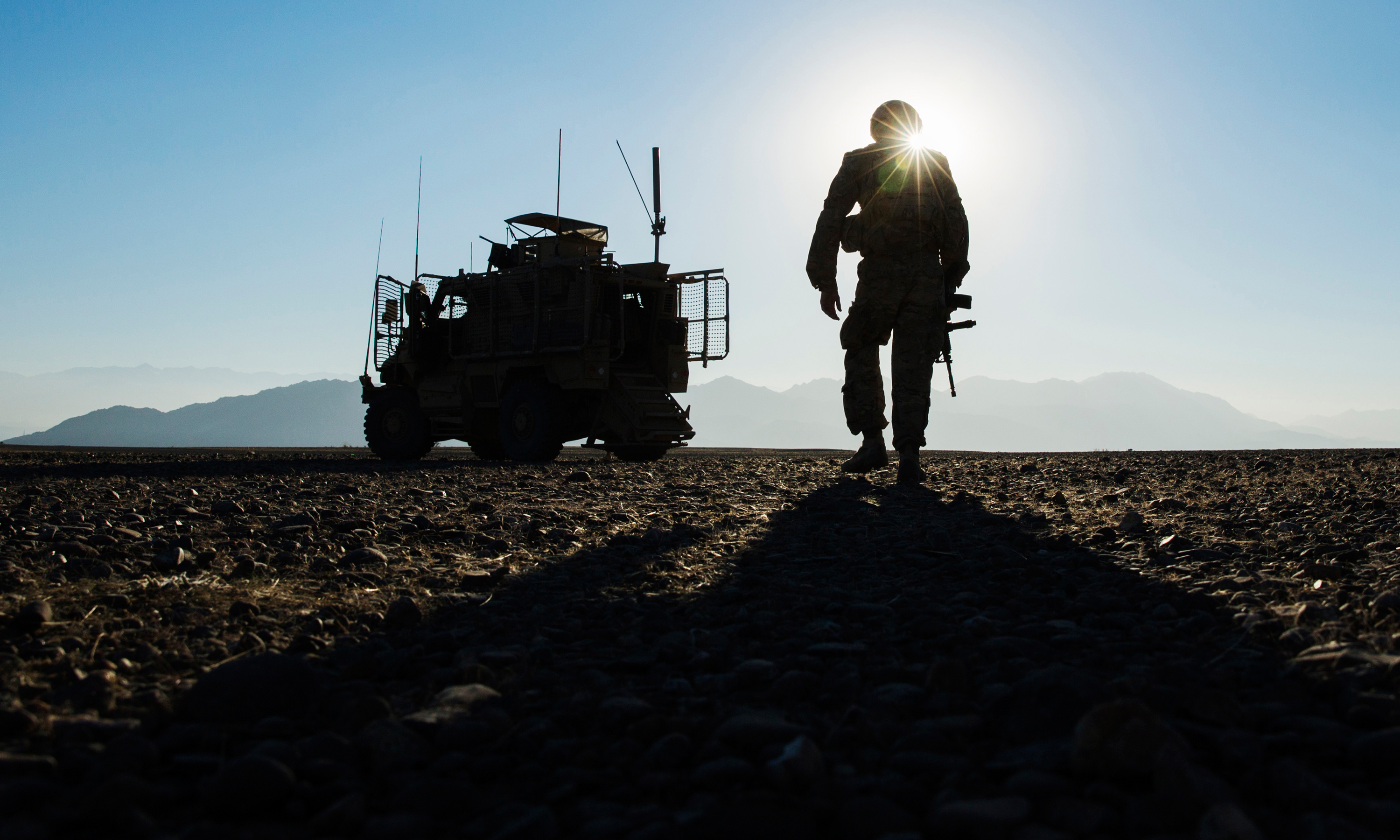Jeb Bush and the amazing never-ending war machine
We're doomed


In William Gibson's recent book The Peripheral, a near-future United States is portrayed as having decayed to the point of developing-country status, with crumbling communities forced into drug dealing to stave off starvation. One implied reason for the decline is an endless series of wars sapping the nation's strength. One character adds them to the traditional list of life's inevitabilities: "there's death and taxes and foreign wars."
For a few years in the mid-2000s, when the sheer monstrosity of Bush's Iraq War was a major story every day, I thought maybe this time we would finally learn our lesson about the limits of American power. Vietnam didn't do it, but maybe Iraq would. It was the most purely stupid action in U.S. foreign policy history, and one of our clearest, most abject, and most humiliating defeats. We started a war of aggression against a ratty tinpot dictatorship, spent 10 years bleeding away our flower of youth and trillions of dollars, and still lost.
As Kevin Drum points out, we're now 0-4 for recent Middle East conflicts, having outright lost in Afghanistan and Iraq and radically destabilized Libya and Yemen. I would put the score at 0-5, to include our various proxy wars in Somalia. In the Middle East, large-scale aggressive use of U.S. military power has left nothing but failed states and galloping radicalism in its wake.
The Week
Escape your echo chamber. Get the facts behind the news, plus analysis from multiple perspectives.

Sign up for The Week's Free Newsletters
From our morning news briefing to a weekly Good News Newsletter, get the best of The Week delivered directly to your inbox.
From our morning news briefing to a weekly Good News Newsletter, get the best of The Week delivered directly to your inbox.
But I think it's clear by now we as a polity haven't learned the limits of force, and may never will. Public opinion polls show that support for the use of ground troops against ISIS has increased from 39 percent in September to 57 percent last week.
Even 2016 presidential candidate Jeb Bush is unconcerned with appearing too cavalier with the use of force, despite the fact that a failed war destroyed his brother's presidency. Wednesday, when Hugh Hewitt asked Bush whether he would be "overly cautious about using force for fear of having a 'third Bush war' occur," he confidently proclaimed he would not: "I would have a duty to protect the United States...I wouldn’t be conflicted by any legacy issues of my family," he said.
Of course, I would not assign all, or even most, of this blame on the public itself. I would rather put most of the blame on two places. First is the press, which on the whole has been utterly shameless in whipping up war fever. When I was on CNN last year a couple times as the token anti-war voice, the entire discussion was framed as if the last decade never happened. American force was presumed to be a vital, near-omnipotent tool, and the major discussion point was whether President Obama was using enough violence.
Jeb Bush illustrated this view later in his interview: "the simple fact is you start with the premise that America’s role in the world is a force for good, not for bad things to happen." He claimed this would lessen the chance of military action. And though Bush is only invoking the national mythos, the truth is obviously the opposite. A childish see-no-evil insistence that America is always and everywhere doing good makes learning from any of our several ongoing catastrophes a priori impossible.
A free daily email with the biggest news stories of the day – and the best features from TheWeek.com
The second, probably more important factor, is the complex of institutions Mike Lofgren calls the Deep State. This comprises the president, various security bureaucracies, their many private-sector allies, and a small selection of the congressional leadership. With the abolition of mass conscript armies, making public opinion far less important, and the utter haplessness of Congress on foreign policy, these are the players who actually decide when and where American force will be used.
They aren't omnipotent, or even very competent, of course. And it's important to note that winning a ground war against ISIS would be a stiff task. As Kevin Drum notes, the largest city under their control, Mosul, is four times larger than Fallujah, which took almost a year of brutal house-to-house fighting to subdue back in 2004.
But starting a new war is a different story. There, the immense agenda-setting power of the Deep State, combined with assertions that American power is 100 percent good and noble thundering from media loudspeakers and classrooms everywhere, is what accounts for the change in polling. Even if public opinion matters, which it doesn't, it turns out to be trivially easy to whip the public into a war froth once or twice a decade.
So, here's how long America can evidently restrain itself from wading into a new likely-disastrous war: about 10 years. A new evil has somehow cropped up, which is definitely not related to anything we've done before, no sir, and so we've got to fight the evildoers. I see no end to this cycle. Likely as not, troops will be charging in again in 2016 or so, and again someplace else in the 2020s, and again and again until we suffer the traditional fate of empires: national bankruptcy and ruin.
Ryan Cooper is a national correspondent at TheWeek.com. His work has appeared in the Washington Monthly, The New Republic, and the Washington Post.
-
 Gavin Newsom and Dr. Oz feud over fraud allegations
Gavin Newsom and Dr. Oz feud over fraud allegationsIn the Spotlight Newsom called Oz’s behavior ‘baseless and racist’
-
 ‘Admin night’: the TikTok trend turning paperwork into a party
‘Admin night’: the TikTok trend turning paperwork into a partyThe Explainer Grab your friends and make a night of tackling the most boring tasks
-
 Find art, beautiful parks and bright pink soup in Vilnius
Find art, beautiful parks and bright pink soup in VilniusThe Week Recommends The city offers the best of a European capital
-
 The billionaires’ wealth tax: a catastrophe for California?
The billionaires’ wealth tax: a catastrophe for California?Talking Point Peter Thiel and Larry Page preparing to change state residency
-
 Bari Weiss’ ‘60 Minutes’ scandal is about more than one report
Bari Weiss’ ‘60 Minutes’ scandal is about more than one reportIN THE SPOTLIGHT By blocking an approved segment on a controversial prison holding US deportees in El Salvador, the editor-in-chief of CBS News has become the main story
-
 Has Zohran Mamdani shown the Democrats how to win again?
Has Zohran Mamdani shown the Democrats how to win again?Today’s Big Question New York City mayoral election touted as victory for left-wing populists but moderate centrist wins elsewhere present more complex path for Democratic Party
-
 Millions turn out for anti-Trump ‘No Kings’ rallies
Millions turn out for anti-Trump ‘No Kings’ ralliesSpeed Read An estimated 7 million people participated, 2 million more than at the first ‘No Kings’ protest in June
-
 Ghislaine Maxwell: angling for a Trump pardon
Ghislaine Maxwell: angling for a Trump pardonTalking Point Convicted sex trafficker's testimony could shed new light on president's links to Jeffrey Epstein
-
 The last words and final moments of 40 presidents
The last words and final moments of 40 presidentsThe Explainer Some are eloquent quotes worthy of the holders of the highest office in the nation, and others... aren't
-
 The JFK files: the truth at last?
The JFK files: the truth at last?In The Spotlight More than 64,000 previously classified documents relating the 1963 assassination of John F. Kennedy have been released by the Trump administration
-
 'Seriously, not literally': how should the world take Donald Trump?
'Seriously, not literally': how should the world take Donald Trump?Today's big question White House rhetoric and reality look likely to become increasingly blurred
